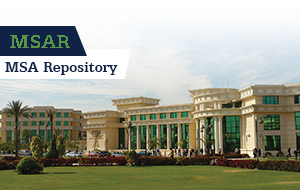Submission

Registration for Attendance* Paper submission and registration for attendance is closed
|
|---|
The Path to City Resilience International Conference

This conference will be a chance to find new solutions and innovations in the resilient urban systems. These creative inventions can be a motive to dynamic, desirable and healthy communities. “The Path to City Resilience” conference is a fertile ground for architects, engineers, city planners, social and political scientists who able to consider new concepts and adapt them according to technological innovations and human desires.
Tel: +202-383-71114/5/6
Fax: +202-383-71543
E-Mail: This email address is being protected from spambots. You need JavaScript enabled to view it. - This email address is being protected from spambots. You need JavaScript enabled to view it.
Keynote Speakers
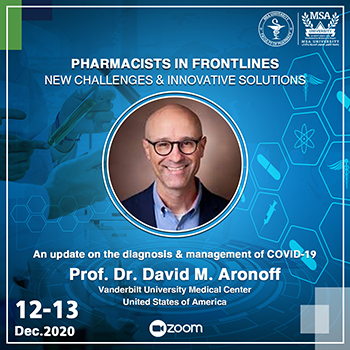 Prof. Dr. David M. Aronoff, MD is the Director of the Division of Infectious Diseases at the Vanderbilt University Medical Center.
Prof. Dr. David M. Aronoff, MD is the Director of the Division of Infectious Diseases at the Vanderbilt University Medical Center.
Prof. Aronoff, has been highly involved in the diagnosis and clinical care of COVID-19. He has been a key communicator of public health measures during the pandemic, through frequent media appearances, educational activities across the region, and direct relationships with employers.
You can follow him on Twitter @DMAronoff.
Title: An update on the diagnosis & management of COVID-19
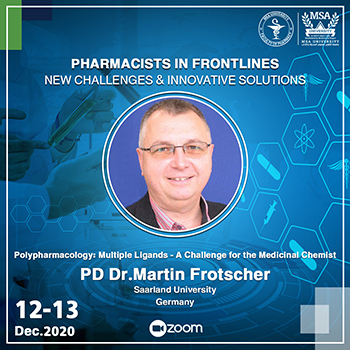 PD Dr Martin Frotscher, born 1966, studied chemistry at Saarland University, Saarbrücken (Germany).
PD Dr Martin Frotscher, born 1966, studied chemistry at Saarland University, Saarbrücken (Germany).
He received his PhD in Medicinal Chemistry in 1997, in the group of Prof. Dr. R. W. Hartmann.
Having held positions in the pharmaceutical and chemical industry (Menarini, Florence (Italy) and Chemcon, Freiburg i. Br. (Germany)), Dr. Frotscher returned to Saarland University, pursuing his research in steroidogenic enzyme inhibition.
In 2018, Dr. Frotscher completed his habilitation and obtained the venia legendi in Pharmaceutical and Medicinal Chemistry
Title: "Polypharmacology: Multiple Ligands - A Challenge for the Medicinal Chemist"
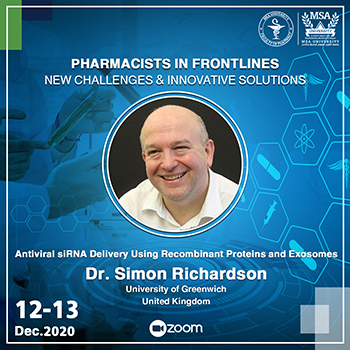 Dr Simon Richardson is a cell biologist who has an interest in drug delivery. His PhD was conducted at the UCL School of Pharmacy and he was a postdoc in Iowa USA studying lysosome biogenesis before starting his own research group at Greenwich is 2007.
Dr Simon Richardson is a cell biologist who has an interest in drug delivery. His PhD was conducted at the UCL School of Pharmacy and he was a postdoc in Iowa USA studying lysosome biogenesis before starting his own research group at Greenwich is 2007.
The focus of his research group is the use of synthetic proteins to manipulate endomembrane for the delivery of siRNA and gene editing machinery. This research focuses on viral disease, cancer and obesity.
Title: Antiviral siRNA Delivery Using Recombinant Proteins and Exosomes.
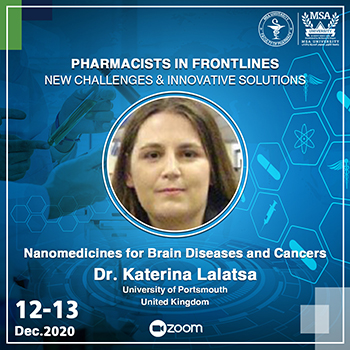 Dr. Katerina Lalatsa- is a Reader in Nanomedicines and MSc Medical Biotechnology course leader at the School of Pharmacy and Biomedical Sciences, University of Portsmouth (UK).
Dr. Katerina Lalatsa- is a Reader in Nanomedicines and MSc Medical Biotechnology course leader at the School of Pharmacy and Biomedical Sciences, University of Portsmouth (UK).
Her lab is focused on the engineering of peptide and polymer amphiphiles for drug delivery and tissue regeneration and on additive manufacture of nanomedicines.
Title: "Nanomedicines for Brain Diseases and Cancers".
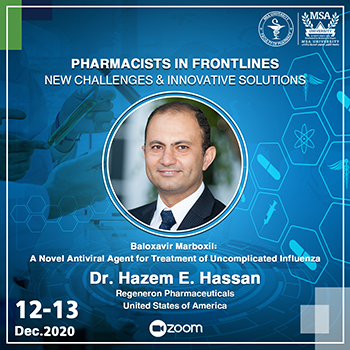 Dr. Hazem E. Hassan, PhD, MS, RPh, FCP is an Associate Director at Regeneron Pharmaceutical Inc. and a fellow of the American College of Clinical Pharmacology (ACCP).
He oversees a variety of programs including neuroscience, hematology and ophthalmology portfolios. Prior to joining Regeneron, Dr. Hassan served as a Clinical Pharmacologist at the FDA and as an Assistant Professor and Director of the Pharmacokinetics and Biopharmaceutics Lab at University of Maryland where he mentored several PhD students, postdocs and visiting scientists.
Dr. Hassan also holds a position as an Associate Professor at Faculty of Pharmacy, Helwan University. He is currently serving on different capacities on several leadership committees of the AAPS, ACCP and ASCPT. He co-authored 45 articles, book chapter and 95 abstracts.
His research was supported by several grants from the FDA, NIH and UMB. In recognition of his contributions, Dr. Hassan received several awards from the FDA, AAPS and UMB, and was featured in the CPT journal, Bioanalysis Journal and AAPS News magazine.
Dr. Hazem E. Hassan, PhD, MS, RPh, FCP is an Associate Director at Regeneron Pharmaceutical Inc. and a fellow of the American College of Clinical Pharmacology (ACCP).
He oversees a variety of programs including neuroscience, hematology and ophthalmology portfolios. Prior to joining Regeneron, Dr. Hassan served as a Clinical Pharmacologist at the FDA and as an Assistant Professor and Director of the Pharmacokinetics and Biopharmaceutics Lab at University of Maryland where he mentored several PhD students, postdocs and visiting scientists.
Dr. Hassan also holds a position as an Associate Professor at Faculty of Pharmacy, Helwan University. He is currently serving on different capacities on several leadership committees of the AAPS, ACCP and ASCPT. He co-authored 45 articles, book chapter and 95 abstracts.
His research was supported by several grants from the FDA, NIH and UMB. In recognition of his contributions, Dr. Hassan received several awards from the FDA, AAPS and UMB, and was featured in the CPT journal, Bioanalysis Journal and AAPS News magazine.
Title: “Baloxavir Marboxil: A Novel Antiviral Agent for Treatment of Uncomplicated Influenza”
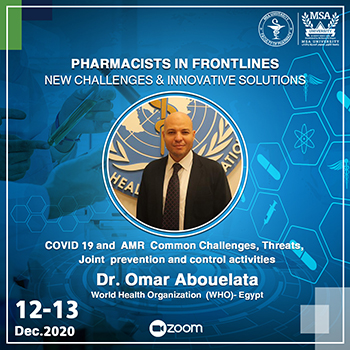 Dr. Omar Abouelata-, MPH, PhD Technical Officer – Surveillance, Preparedness and Response WHO/WRO/Egypt Title: COVID 19 and AMR Common Challenges, Threats, Joint prevention and control activities
Dr. Omar Abouelata-, MPH, PhD Technical Officer – Surveillance, Preparedness and Response WHO/WRO/Egypt Title: COVID 19 and AMR Common Challenges, Threats, Joint prevention and control activities
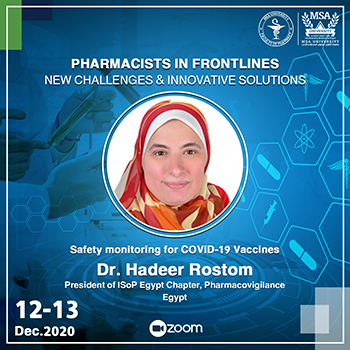 Dr. Hadeer Rostom was a principal contributor in issuing the “Good Pharmacovigilance Practice guidelines in Arab Countries” (GVP-Arab).
Dr. Hadeer Rostom was a principal contributor in issuing the “Good Pharmacovigilance Practice guidelines in Arab Countries” (GVP-Arab).
She played an important role in strengthening Pharmacovigilance practice in Egypt and integrating pharmacovigilance teaching in Academia. She supervised several pharmacovigilance research projects. Hadir is seen as a strategic pharmacovigilance figure in Egypt and the region.
Title: Safety monitoring for COVID-19 Vaccines
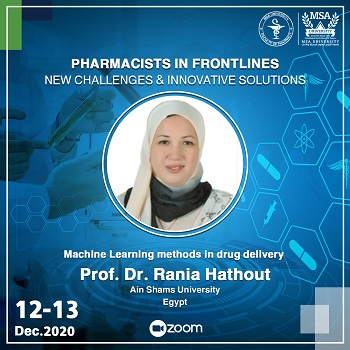 Prof. Dr. Rania Hathout, currently works as a Professor at the Faculty of Pharmacy, Ain Shams University. Prof. Dr. Rania, does research in Nanomedicine and Drug Delivery, Nanotechnology, Polymer Chemistry, Physical Chemistry and Chemoinformatics.
Prof. Dr. Rania Hathout, currently works as a Professor at the Faculty of Pharmacy, Ain Shams University. Prof. Dr. Rania, does research in Nanomedicine and Drug Delivery, Nanotechnology, Polymer Chemistry, Physical Chemistry and Chemoinformatics.
Her current project is 'Preparation of drug-loaded conducting polymers using electrochemical polymerization - Department of Chemistry and Materials Science Institute - Lancaster University - Lancaster - UK.
Title: " Machine Learning methods in drug delivery "
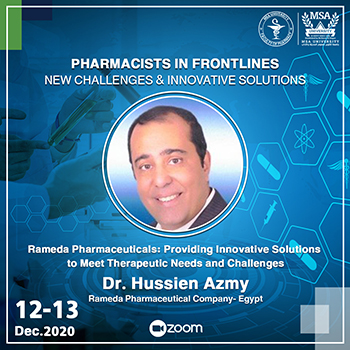 Dr. Hussien Azmy, is leading the Marketing, Medical, Training, Regulatory as well as the New Product and Product Portfolio Planning and Business Development in Egypt, Middle East and Africa
Dr. Hussien Azmy, is leading the Marketing, Medical, Training, Regulatory as well as the New Product and Product Portfolio Planning and Business Development in Egypt, Middle East and Africa
Title: “Rameda Pharmaceuticals: Providing Innovative Solutions to Meet Therapeutic Needs and Challenges”
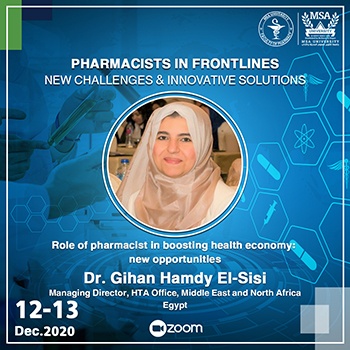 Dr. Gihan Hamdy El-Sisi- Lecturer_Health Economics, Arab Academy for Science & Technology & Cairo University
Dr. Gihan Hamdy El-Sisi- Lecturer_Health Economics, Arab Academy for Science & Technology & Cairo University
Health Economics Certificate Scientific Committee, American University in Cairo
Founder and Former Head of Pharmacoeconomic Unit, CAPA, MoH, Egypt
Health Economics Consultant, World Health Organization EMR Office
Treasurer of International Society for Pharmacoeconomics and Outcomes Research (ISPOR) Egypt
Title: “Role of pharmacist in boosting health economy: new opportunities”
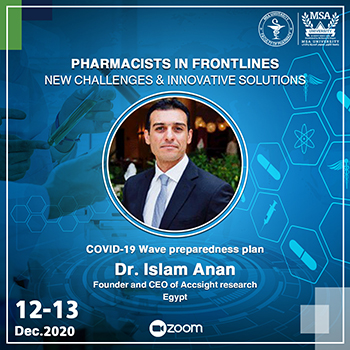 Dr. Islam Anan is leading Accsight offices in the Middle East and Africa for the 3 business units (Accsight HIS) Marketing Research, Market Access, HEOR and Real World Evidence Research, (Accsight PSP).
Dr. Islam Anan is leading Accsight offices in the Middle East and Africa for the 3 business units (Accsight HIS) Marketing Research, Market Access, HEOR and Real World Evidence Research, (Accsight PSP).
He is Course Instructor for Economic Evaluation in the Health Economics Diploma and lecturer of Pharmacoeconomics and Health Care Marketing
Title: “COVID-19 Wave preparedness plan”
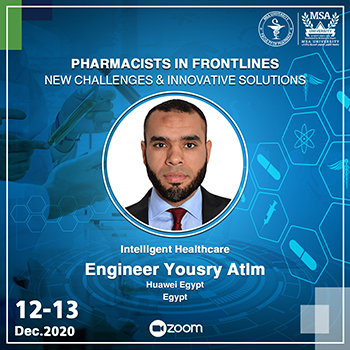 Title: Intelligent Healthcare
Title: Intelligent Healthcare
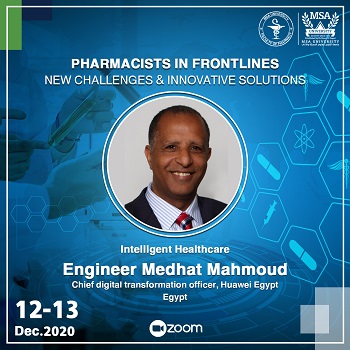 Eng. Medhat is a core member in Huawei’s global Digital Transformation Office. He is a senior ICT and IoT global industry expert who has led successful projects and digital transformation initiatives with the major international ICT industry leaders and held various senior positions, managing global assignments in North America, MEA, and APAC.
Eng. Medhat is a core member in Huawei’s global Digital Transformation Office. He is a senior ICT and IoT global industry expert who has led successful projects and digital transformation initiatives with the major international ICT industry leaders and held various senior positions, managing global assignments in North America, MEA, and APAC.
Title: Intelligent Healthcare
Workshop
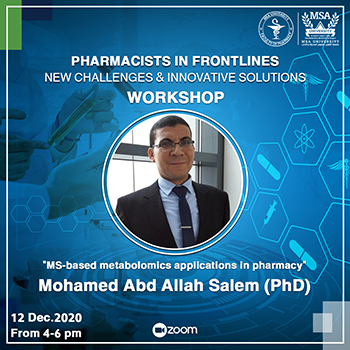 Mohamed Abd Allah Salem (PhD), Lecturer,Pharmacognosy Department, Faculty of Pharmacy, Menoufia University
Mohamed Abd Allah Salem (PhD), Lecturer,Pharmacognosy Department, Faculty of Pharmacy, Menoufia University
Title “MS-based metabolomics applications in pharmacy”
Description
Understanding of complex biological systems requires the measurement, analysis and integration of multiple compound classes of the living cell, usually determined by transcriptomic, proteomic and metabolomics measurements. Metabolomics studies aim for the identification and quantification of the complement of all small molecules and lipids within a biological system.
In recent years, metabolomics has emerged as cornerstones in the field of systems biology. This workshop will provide the participants with: Introduction to ‘omics’ technologies Experimental design and sample preparation in metabolomics studies MS-based metabolomics analysis Multivariate data analysis
To be eligible for this workshop you need to:
Have some basic experience in practical/theoretical gas/liquid chromatography (GC/LC) and mass spectrometry (MS).
Have a master’s degree or similar.
 Eman Gomaa (PhD) Associate Professor of Biochemistry Department. Faculty of Pharmacy, MSA University. M.Sc. Fellow of Copenhagen University (Panum Institute), Denmark Ph.D. Fellow of the Technical University in Munich (Klinikum rechts der Isar), Germany Postdoctoral fellow of Mount Sinai School of Medicine, NY, USA. Postdoctoral fellow of Pierre et Marie Curie University, ParisVI - Currently Sorbonne, (L’Hopital Salpetrier Medical School), Paris, France
Eman Gomaa (PhD) Associate Professor of Biochemistry Department. Faculty of Pharmacy, MSA University. M.Sc. Fellow of Copenhagen University (Panum Institute), Denmark Ph.D. Fellow of the Technical University in Munich (Klinikum rechts der Isar), Germany Postdoctoral fellow of Mount Sinai School of Medicine, NY, USA. Postdoctoral fellow of Pierre et Marie Curie University, ParisVI - Currently Sorbonne, (L’Hopital Salpetrier Medical School), Paris, France
Title: “Genetic Toxicology: A Regulatory Requirement in the Discovery and Development of New Pharmaceuticals”
Description:
Genetic toxicology data is used as an alternate for long-term carcinogenicity data during early drug development. It represents an important part of preclinical safety assessment of new drugs and is required prior to Phase I/II clinical trials. It is designed to identify potentially hazardous drug candidates by detecting their genetic damage such as gene mutations and chromosomal aberration, which may be reflected in tumorigenic or heritable mutation potential of the drug.
Learning Outcomes:
Participants in this workshop will gain knowledge about the following:
- Introduction to genetic toxicology and its impact on drug discovery and development
- Differences between genotoxicity, mutagenicity and cytotoxicity
- Principle, procedures and data analysis of different techniques used in genetic toxicology during the process of drug development
- Single cell gel electrophoresis assay
- Methods for detection of chromosomal aberrations
- Micronucleus test
To be eligible for this workshop you need to:
Pharmacy graduates interested in genetics and toxicology.
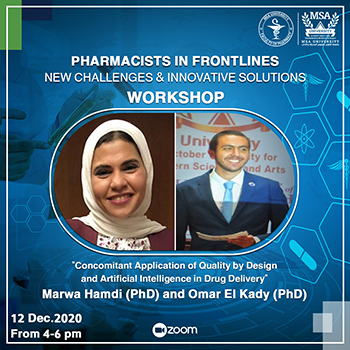 Marwa Hamdi (PhD) and Omar El Kady (PhD) ,Lecturer,Pharmaceutics Department, Faculty of Pharmacy,MSA University
Marwa Hamdi (PhD) and Omar El Kady (PhD) ,Lecturer,Pharmaceutics Department, Faculty of Pharmacy,MSA University
Title: “Concomitant Application of Quality by Design and Artificial Intelligence in Drug Delivery”
Description:
Quality by Design (QbD) is an industry initiative supported by regulators. However, it is also a systematic method of process development which delivers consistency, robustness and increased process knowledge. QbD is certainly becoming a scientific, risk based proactive approach to pharmaceutical product development. Artificial intelligence can be potentially used to create the multidimensional interactions of input variables and to closely bind these variables to a design space.
Goal
This workshop will provide the participants with:
- Comprehensive understanding of QbD including current uses and promised use
- The overall logic and flow of the QbD development process, which includes the use and application of the various tools
- Development and use of Quality Target Product Profiles (QTPPs)
- Definition and verification of Critical Quality Attributes (CQAs), Critical Material Attributes (CMAs) and Critical Process Parameters (CPPs)
- Facets of statistical design of experiments (DOEs), using different response surface methodologies and artificial intelligence technique.
- Design Space and its application in process control, lifecycle management, understanding design space limits.
- Development and optimization of process control strategies.
- Direct application of the steps of QbD and artificial intelligence in the drug formulation.
To be eligible for this workshop you need to:
Have some basic knowledge on statistical analysis
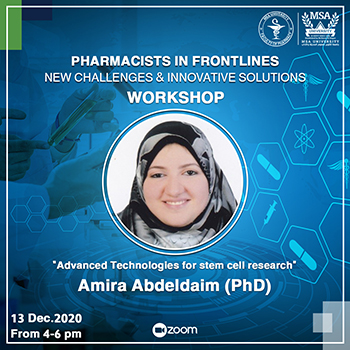 Amira Abdeldaim (PhD), Lecturer of Biochemistry, Faculty of Pharmacy, MSA University. Postdoctoral researcher in The AIDS research center, Kunamoto University, Japan Postdoctoral researcher in the International research center for medical sciences (IRCMS), Kunamoto University, Japan.
Amira Abdeldaim (PhD), Lecturer of Biochemistry, Faculty of Pharmacy, MSA University. Postdoctoral researcher in The AIDS research center, Kunamoto University, Japan Postdoctoral researcher in the International research center for medical sciences (IRCMS), Kunamoto University, Japan.
Title: “Advanced Technologies for stem cell research”
Description
During this workshop, we will discuss different technologies utilized in the stem cell research to analyse the cell differentiation and explore the mechanisms controlling cell differentiation and self-renewability.
To be eligible for this workshop you need to:
With background of molecular biology and stem cell biology
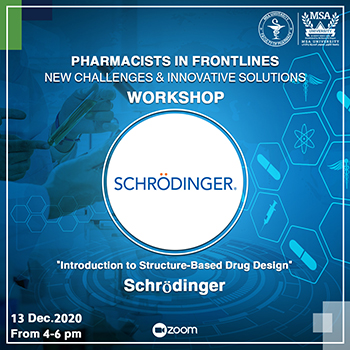 Schrödinger
Schrödinger
Title: “Introduction to Structure-Based Drug Design”
Description
This workshop is powered by Schrödinger’s industry-leading computational platform to accelerate drug discovery and materials design is deployed by leading biopharmaceutical and industrial companies, academic institutions and government laboratories worldwide. Schrödinger is also applying its computational platform to a diverse and extensive pipeline of drug discovery programs in collaboration with pharmaceutical companies and has co-founded leading biotech companies.
In addition, Schrödinger is using its platform to advance a pipeline of internal, wholly-owned drug discovery programs. It will include 1-hour live demo and the distribution of evaluation licenses for an opportunity to try out the Schrödinger's drug discovery suite “Maestro”.
To be eligible for this workshop you need to:
Pharmacy Postgraduates with interest in medicinal chemistry
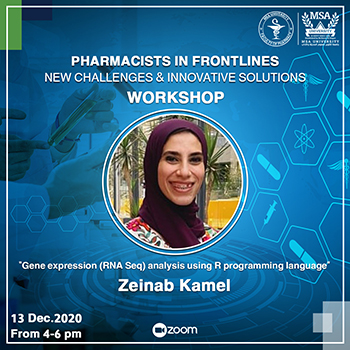 Zeinab Kamel-, Microbiology and Immunology Department, Faculty of Pharmacy, MSA University.
Zeinab Kamel-, Microbiology and Immunology Department, Faculty of Pharmacy, MSA University.
Title:“Gene expression (RNA Seq) analysis using R programming language”
Description:
The workshop will briefly discuss and provide hands-on practice with RNA sequencing and analysis using computational biology and bioinformatics. An overview will be given on the fundamentals of OMICs based sciences, in particular, transcriptome. The main steps of RNA-sequencing and analysis workflow will be highlighted, including; cDNA library preparation, a quality check of fastq files, genome alignment, and identification of differentially expressed genes.
Learning outcomes:
- By the end of this workshop, the participants will be able to:
- Understand fundamentals of molecular biology and transcriptomes.
- Outline the required steps of RNA-seq analysis workflow.
- Recognize and distinguish between different parts of Rstudio.
- Run a script and interpret results of data analysis on Rstudio.
- Annotate the expressed genes on web-based tools (Gprofiler or GSEA).
To be eligible for this workshop you need to:
Have some basic knowledge of OMICs-based science
Know the fundamentals of R programming language
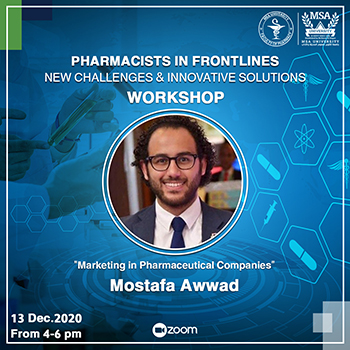 Mostafa Awwad Cardiovascular Renal Metabolic Marketing Manager. AstraZeneca
Mostafa Awwad Cardiovascular Renal Metabolic Marketing Manager. AstraZeneca
Title: “Marketing in Pharmaceutical Companies”
Program Booklet
If you cannot view the below document, please click here. | Download the Program Booklet
Call for Submission
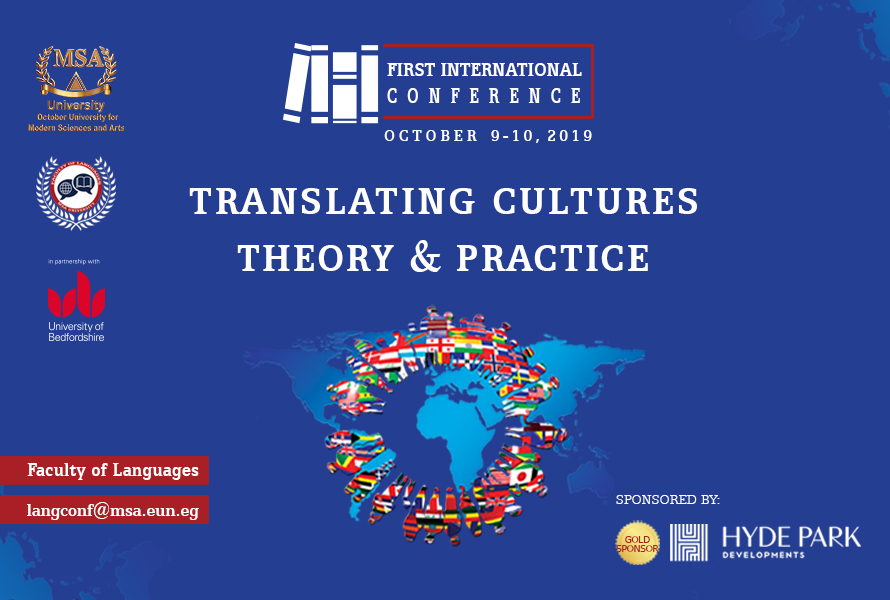
You are invited to send an abstract of 250-300 words to the following email: This email address is being protected from spambots. You need JavaScript enabled to view it.
Deadline for sending abstracts: 30th June, 2019
Acceptance notification: 11th July, 2019 (Abstracts are subject to a peer-review process)
Registration fees for presenters:
250 EGP for Egyptians
100$ for non-Egyptians
Registration fees for attendees:
150 EGP for Egyptians (Including a certificate of Attendance)
50$ for non-Egyptians
• Registration fees cover conference material, coffee breaks and refreshments for the two days.
• For any inquiries, send an email to This email address is being protected from spambots. You need JavaScript enabled to view it.
Keynote Speakers
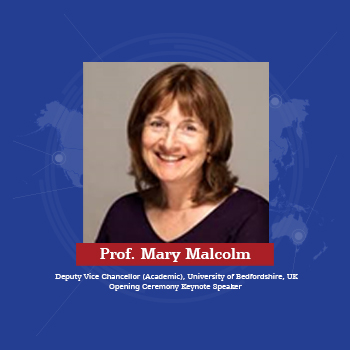 Professor Mary Malcolm, Deputy Vice Chancellor (Academic), University of Bedfordshire, UK Opening Ceremony Keynote Speaker
PPT Title: “Last in Translation: The Promise and Practice of a Research-Teaching Nexus”
- At University of Bedfordshire, Professor Malcolm has overall responsibility for the quality of the learning experience, including the work of the Centre of Learning Excellence to integrate into the curriculum the knowledge and skills that support enterprise, environmental sustainability, and global citizenship.
- She further has a leading role in partnership development (UK and overseas), quality assurance and organizational development.
Professor Mary Malcolm, Deputy Vice Chancellor (Academic), University of Bedfordshire, UK Opening Ceremony Keynote Speaker
PPT Title: “Last in Translation: The Promise and Practice of a Research-Teaching Nexus”
- At University of Bedfordshire, Professor Malcolm has overall responsibility for the quality of the learning experience, including the work of the Centre of Learning Excellence to integrate into the curriculum the knowledge and skills that support enterprise, environmental sustainability, and global citizenship.
- She further has a leading role in partnership development (UK and overseas), quality assurance and organizational development.
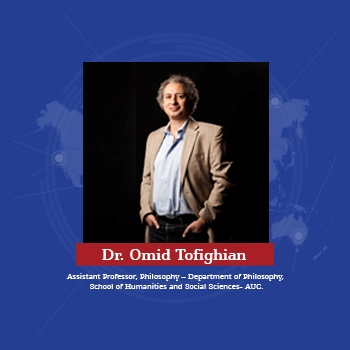 Dr. Omid Tofighian-
Dr. Omid Tofighian-
Assistant Professor, Philosophy – Department of Philosophy, School of Humanities and Social Sciences- AUC. Second Day Keynote Speaker
PPT Title: “Refugee Filmmaking and the Border-Industrial Complex”
- Omid Tofighian is an award-winning lecturer, researcher and community advocate, combining philosophy with interests in citizen media, popular culture, displacement and discrimination. He contributes to community arts and cultural projects and works with refugees, migrants and youth.
- Tofighian has taught at different universities in Australia, the United Arab Emirates, Belgium, the Netherlands & Egypt. He has published numerous book chapters and journal articles.
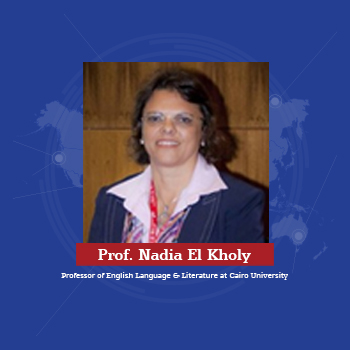 Prof. Nadia El Kholy, Professor of English Language & Literature at Cairo University
PPT Title: “The Fairy Tale and Translation: Is there an Egyptian Cinderella?”
- University of Bedfordshire External Examiner at MSA University-Faculty of Languages
- Nadia El Kholy was the Cultural Counsellor at the Egyptian Embassy in London from 2012-2015. She served as Director of the National Council for Children’s Culture, was a member of the jury for the Hans Christian Anderson international award for Children's Literature and is currently a member of the IBBY (international Board of Books for Young Readers) Executive Committee as well as President of the Egyptian Board of Books for Young Readers (EBBY).
- Her research interests include writing and translation for children, Comparative and Postcolonial Literature, and Gender Studies.
Prof. Nadia El Kholy, Professor of English Language & Literature at Cairo University
PPT Title: “The Fairy Tale and Translation: Is there an Egyptian Cinderella?”
- University of Bedfordshire External Examiner at MSA University-Faculty of Languages
- Nadia El Kholy was the Cultural Counsellor at the Egyptian Embassy in London from 2012-2015. She served as Director of the National Council for Children’s Culture, was a member of the jury for the Hans Christian Anderson international award for Children's Literature and is currently a member of the IBBY (international Board of Books for Young Readers) Executive Committee as well as President of the Egyptian Board of Books for Young Readers (EBBY).
- Her research interests include writing and translation for children, Comparative and Postcolonial Literature, and Gender Studies.
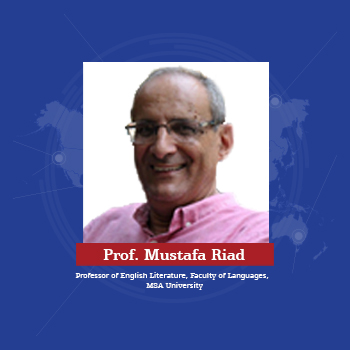 Prof. Mustafa R M Riad, Professor of English Literature, Faculty of Languages, MSA University
PPT Title: “Ethical and Social Responsibility in the Practice of Translation: A Case Study of Egyptian Translators in Modern Times”
- Professor Riad's research interests include comparative studies and translation. He is a translator and editor of several works and studies in literature and the humanities. Published papers and took part in conferences in Egypt and abroad in the fields of theatre and translation. He is the Ex- Editor-in-chief of Al Masrah (Theatre) magazine published by the General Egyptian Book Organization. And an esteemed expert in the Literature Committee of the Academy of the Arabic Language.
Prof. Mustafa R M Riad, Professor of English Literature, Faculty of Languages, MSA University
PPT Title: “Ethical and Social Responsibility in the Practice of Translation: A Case Study of Egyptian Translators in Modern Times”
- Professor Riad's research interests include comparative studies and translation. He is a translator and editor of several works and studies in literature and the humanities. Published papers and took part in conferences in Egypt and abroad in the fields of theatre and translation. He is the Ex- Editor-in-chief of Al Masrah (Theatre) magazine published by the General Egyptian Book Organization. And an esteemed expert in the Literature Committee of the Academy of the Arabic Language.
Translating Cultures: Theory and Practice

The conference offers an engaging platform for academicians, theorists, artists and practitioners from different backgrounds to share their ideas on how languages and narratives can be diversely understood across different cultures and contexts.
The conference aims to highlight the role of cultures and/or cultures in translation in enlightening people and transmitting diverse values, narratives and histories. This enlightenment contributes to a level of understanding that leads to appreciation, tolerance, acceptance and inter/cross-cultural communication.
Dear Colleagues
Please be advised that there would be a publication opportunity for the BEST 15 to 20 papers in a book adopted from the conference which will be published by Cambridge Scholar Publishing within a year after the end of the conference.
The Deadline for sending abstracts is thereby extended to June 30, 2019
1- Challenges of Cultural Translation
2- Transnationalism
3- Intercultural Encounters
4- Performing Cultures
5- History and Culture in Literary Texts
6- Translating History between Theory and Practice
7- Translation and Media
8- Culture and Education
9- Culture and Arts
10- Localization and Globalization
11- Language and Cultural Transformations
12- Multiculturalism and identity
13- Sociocultural Contexts in Teaching EFL
14- Digital Humanities
15- Cyber Culture



